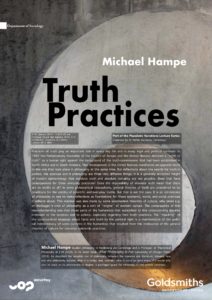
24th January 2019 | 4.30-6.30 pm Professor Stuart Hall Building (PSH) 314
Goldsmiths, University of London London SE14 6NW
Part of the Pluralistic Variations Lecture Series
Organised by Dr Martin Savransky (Sociology)
TRUTH PRACTICES
Prof Michael Hampe (ETH Zürich)
Practices of truth play an important role in every day life and in many legal and political contexts. In 1987 the Parliamentary Assembly of the Council of Europe and the United Nations declared a “right to truth” as a human right against the background of the truth-commissions that had been established in South Africa and in South America. This development in the United Nations manifested an opposite trend to the one that took place in philosophy at the same time. But reflections about the search for truth in politics, the sciences and in philosophy are three very different things. It is a generally accepted insight of modern epistemology that absolute truth and absolute certainty are not possible. Does that have consequences for these everyday practices? Does the impossibility of absolute truth mean that there are no truths at all? In some philosophical conceptions, general theories of truth are considered to be conditions for the validity of scientific and everyday truths. But that is not the case. It is an old mistake of philosophy to see its meta-reflections as foundations for those epistemic, moral, and social practices it reflects about. This mistake was also made by some postmodern theorists of culture, who relied e.g. on Heidegger ́s view of philosophy as a sort of “engine” of western culture. The consequence of this misunderstanding was that those parts of the humanities that subscribed to this understanding became irrelevant to the sciences and to politics, especially regarding their truth practices. The “hijacking” of the constructivist language about facts and truth by the political right is a manifestation of the politi- cal indeterminacy of some currents in the humanities that resulted from this irrelevance of the general theories of culture for concrete epistemic practices.
Michael Hampe studied philosophy in Heidelberg and Cambridge and is Professor of Theoretical Philosophy at ETH Zurich. In his latest book, What Philosophy Is For (University of Chicago Press, 2018), he described the possible role of philosophy between the sciences and literature, showing how and why philosophy became what it is today, and, crucially, what it could be once more, if it would only turn its back on its pretensions to dogma: a privileged space for reflecting on the human condition.
